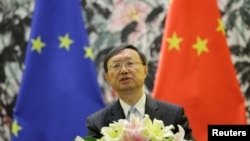Not everyone was dismayed by the harsh rhetoric that marked the opening of last week’s high-level U.S.-China talks in Alaska. Chinese merchandisers are already cashing in with a slew of products feeding a wave of nationalism that the talks inspired.
T-shirts, umbrellas, handbags and mobile phone cases are among the items now on sale in Beijing and online, emblazoned with quotations from Yang Jiechi, the top diplomat who delivered a fierce rebuttal to American criticisms at the start of the Anchorage meetings.
On e-commerce giant JD.com, for example, Chinese customers can pay about $11 for a T-shirt saying, “Chinese people won’t tolerate this.” A canvas tote bag with “The U.S. is in no position to talk down to China” sells for about $13.
Hu Jia, a China observer and rights activist, told VOA the Beijing government does not usually allow any political slogans on clothing. And any clothing with slogans critical of the ruling Chinese Communist Party would be quickly confiscated. But channeling nationalistic sentiments is a longtime party tactic that seems to be happening here.
“To the CCP, nationalism must be controlled. Otherwise, it could turn into street movements, which would be troublesome,” he said. “China does not allow those kinds of movements.”
For now, the merchandise with Yang’s words can be sold and used without being censored. Gao Yu, a Chinese journalist and dissident, said that while authorities may permit the sales now, the coarse language on merchandise carries risks down the road.
Gao said, “Promoting populism with non-civil words is not beneficial to younger generations and improving the average Chinese’s educational level.”
Leng Jiefu, a former political professor at Renmin University of China, opposes the practice of allowing some businesses to set off a social thought trend in order to achieve personal business success. He called this practice opportunism that the government wouldn’t encourage.
Leng said, “In this case, it is simply that some businessmen want to seize this opportunity to make a fortune. This kind of behavior is detrimental to the image of our country. This crazy way is completely unnecessary. It is not good for the government.”
Li Datong, a journalist in Beijing, does not think the government is behind the social trend and does not see much harm in the efforts of businesses to capitalize on attention being paid to the Alaska meeting.
"The businessmen predicted this kind of T-shirt would be popular, so they made some,” he said. “If nobody wants them, then they will be gone. It’s a spontaneous thing, just for making money. It will soon disappear. There’s a little dark humor in it. People don’t really take it seriously.”





